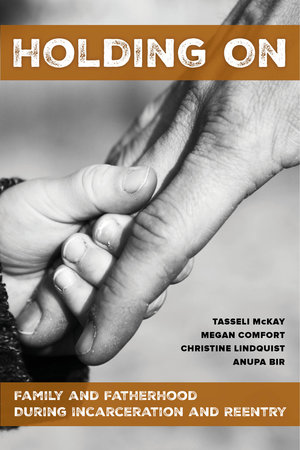By Tasseli McKay, Megan Comfort, Christine Lindquist, and Anupa Bir; authors of Holding On: Family and Fatherhood during Incarceration and Reentry
This guest post is part of our ASA blog series published in conjunction with the meeting of the American Sociological Association in New York City, NY, August 10-13. #ASA19
Imagine for a moment that all someone knew about you came from a single database – say, your DMV, medical, or tax records. Now imagine that what could be known about you from these data determined the preponderance of services offered to you, requirements made of you, and restrictions placed on you. Chances are that you would feel frustrated to be defined by one characteristic and that the full dimensionality of your life was being flattened. That there was so much more to you than what could be seen through that single lens.
In our recently published book Holding On: Family and Fatherhood during Incarceration and Reentry, we assert that for too long, incarcerated fathers and their families have suffered from this monochromatic perspective. People in prison or on parole are defined by criminal justice databases that don’t take into account their status as parents or partners. Low-income families with fathers who have been removed by incarceration often fall into child welfare or social services databases that don’t recognize the specific challenges imposed by involvement with the legal system. For these individuals, not being seen as whole people often results in needs going unmet, untenable requirements being imposed, and relationships being stretched to the breaking point. For society, separating information about people as family members and as prisoners into silos hides the true costs of mass incarceration on parents, partners, and children.
Holding On draws on rich data from the Multi-site Family Study on Incarceration, Parenting, and Partnering (MFS-IP), an unprecedented 10-year mixed-methods study of 1,482 incarcerated fathers and their female partners. In an effort to generate a more complete view of these families, we interviewed both members of the couple over time, when possible speaking with them both during the prison sentence and after release. We asked them questions about co-parenting and their relationships as well as their experiences with incarceration, attempting to learn about the interface of these aspects of their lives.
The theme of this year’s American Sociological Association annual meeting is “Engaging Social Justice for a Better World.” Through our work on MFS-IP, we have tried to use more comprehensive and human-focused data to better understand the full dimensionality of people’s lives and inform ideas about what social justice might look like for families surviving incarceration. At a systems level, our findings suggest that the extractive and surveilling (rather than supportive) orientation of correctional and community supervision policies toward men’s relationships is dually devastating. First, these practices—arrest procedures that traumatize children, assignment of prisoners to locations hundreds of miles from their home communities, exorbitant telephone rates for calls from prisons, the shifting of criminal justice system costs and fees onto families—can strain or destroy the ties that serve as a lifeline for post-prison reintegration. Second, in so doing, the same practices may also undermine the chances of programmatic or institutional “success.” By neglecting or undermining the interconnectedness of criminal justice system involvement and family life, such policies may actually prevent criminal justice agencies from moving the needle on their most widely accepted metric (avoidance of reincarceration)—while also thwarting the efforts of human services systems focused on stabilizing families, promoting positive parenting, and lifting women and children out of poverty.




